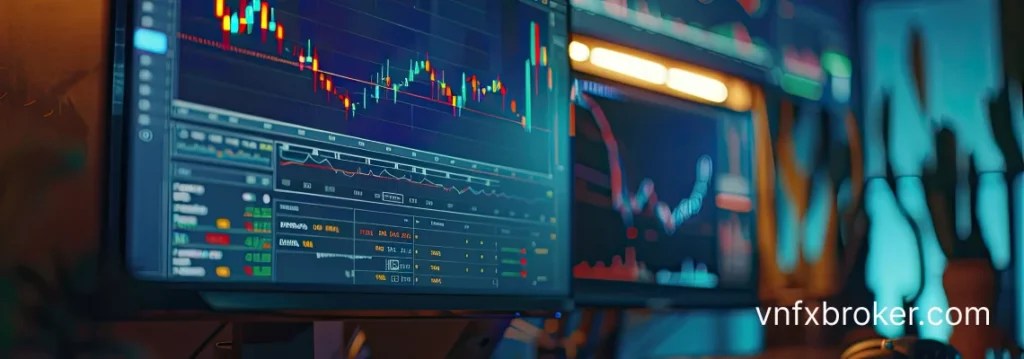Forex or Stock Trading: Where to Invest Your Money?
Although both forex trading vs stock trading have similarities and are interconnected in some ways, they are two different markets. As these markets are literally the most popular in the context of trading, we couldn’t but dedicate this piece to them.
Let’s reveal what each market is about, how they work, and what advantages and risks they have. Join us as we talk about forex trading vs stock market in detail, discussing opportunities, challenges, and trading conditions for you specifically.


Forex Market: Description of Its Features and Functioning
To make a comprehensive overview and compare stock trading vs forex trading, we should remind ourselves of what they are, and we propose starting with forex.
Basically, forex is a global and time-proven market for trading currencies: major currencies that are the most popular (e.g., EUR/USD or GBP/USD), minor ones that do not include the US dollar but still are in demand (EUR/GBP, EUR/AUD, etc.), and exotic that consist of one major currency and one from a developing or relatively smaller economy (for instance, USD/TRY or USD/ZAR).
Around the globe, forex is known for its decentralization, which is a pretty good thing that lets traders complete deals directly with each other. Also, it’s important to note that the market works 24 hours a day, 5 days a week, except for some holidays.
In general, forex involves such participants: central banks, corporations, financial institutions, hedge funds, and individual traders. Its aim (roughly speaking) is to boost international trade by allowing people to convert one currency into another. Simply put, to make profits, forex traders speculate on currency price movements.
Stock Market: Review of the Basic Principles and Features of Stock Trading
As for stock market trading, it’s a collection of exchanges and markets that represent ownership. How it works? You buy shares, become a partial owner of the asset, and that’s it — now, you can reap the benefits from dividends and earn on it.
Major exchanges on the stock marketplace involve NYSE (New York Stock Exchange) and Nasdaq; they serve as platforms for investors to trade stocks and other assets. Overall, stock trading is about buying/selling shares of the specific companies with the estimates that they will increase/decrease and bring investors some profit.
The market operates on weekdays only, within the specific hours. These hours vary depending on the region and stock exchange, e.g., NYSE works from 9:30 AM to 4:00 PM (ET), while LSE’s (London Stock Exchange) trading hours are from 8:00 AM to 4:30 PM (GMT).


Advantages and Disadvantages of Each Market
Like everything in this world, forex and stock trading markets have their pros and cons. See the greatest of them in the lists below.
Advantages of Forex Trading: Opportunities in the Forex Market
Among strong points of forex trading, there are:
- Really High Liquidity. The market is considered to have the highest liquidity, which means you enter/exit positions in the blink of an eye.
- Available 24 Hours. On the forex market, you can trade anytime during weekdays.
- Pleasant Leverage. Forex brokers usually offer their clients high leverage levels that allow traders to hold large positions.
- Low-Cost Transactions. In most cases, forex features lower transaction costs than stock trading.
- Accessible Market. To be suitable for both big corporations and individual traders, forex has pretty low capital requirements.
- Tons of Strategies. While trading forex, you can choose among so many approaches. The most popular and result-oriented forex trading strategies are scalping, day trading, and swing trading.
This is not the whole list of all the superb things the forex market has in its pocket. Although, it’s more than enough for newcomers to understand why forex is one of the most popular trading markets out there.
Disadvantages of Forex Trading: What Risks Are Hidden
Every rose has its thorn, and every market has its risks. Forex isn’t an exception, so we welcome you to check what “bad” sides it can have:
- Wildly High Volatility. Forex is famous for its extreme volatility that results in huge price swings. This can be a good thing that allows for creating more profit, but it also increases the risk of losses.
- Leverage-Related Risks. Just like volatility, leverage can lead to losses if the market is unstable and goes against your position.
- Intricate Market. There are so many factors that affect the forex market, including geopolitical, economic, and central bank decisions. Such a complexity challenges traders, especially newbies.
- Scam Brokers. As the forex market is a bit less regulated than other markets, scammers can take advantage of it. Bearing this in mind, always choose well-regulated, experienced, and globally recognized brokers.
Most of these risks (except for scammers, of course) can be turned into a positive experience. For this, monitor changes, learn about how to conquer the highly volatile market, and use leverage wisely, being in sync with current trends.


Advantages of Stock Trading: Benefits of Stock Market Trading
To compare the stock market vs forex market, we should pay attention to the stock’s best sides, too. Check below what online stock trading can offer you:
- Partial Ownership. If you buy stocks, you become a partial owner of the asset, and it can bring you dividends and even voting rights.
- Best Regulation. The stock market features great regulation; it means everything is transparent and protected.
- Persistent Growth. Those who choose stocks usually see long-term growth, which the market historically provides.
- Variety of Choices. In the financial world, there are so many stock options. Trading on this market equals diversification and a ton of companies and industries you can invest in.
- Numerous Strategies. Same as with forex, the stock market shines with a great deal of strategies to choose from. The most popular stock trading strategies are value investing, growth investing, and momentum trading.
As you can see, both forex and stock markets offer exceptional benefits for investors. But what drawbacks do stocks have, and are they more “terrifying” than forex’s? Keep on reading, and let’s explore it in the next chapter.
Drawbacks of Stock Trading: What Pitfalls to Await
The worst sides of stock trading include:
- Not-So-Friendly Costs. If compared with forex, stock trading has pretty high translation fees and commissions, which is crucial for small traders.
- Limited Hours. You cannot trade at any hour you want, you must trade at a specific time, which differs for all assets.
- Company-Related Risks. When investing in individual stocks, remember that there are company-specific risks, like changes in trends, management, or regulatory problems.
- High Kick-Off Investment. Trading in the stock market requires a higher initial investment to start trading and diversify your portfolio.
- Lower Liquidity. Not all, but some stocks may suffer from lower liquidity, meaning you cannot buy/sell shares quickly.
These risks aren’t that scary if you know how to deal with them — a good strategy can allow you to trade all markets, whether it’s stock, forex, or any other market.


Comparison of Trading Conditions
Now, let’s summarize everything that was written before in a concise table. Check and compare for yourself which market can be the best for you, depending on your trading needs, goals, and preferences.
Aspect | Forex Market | Stock Market |
Instruments | Currency pairs (Major, Minor, Exotic) | Stocks (Large-cap, Mid-cap, Small-cap) |
Liquidity | High, especially in major pairs | Varies, high in large-cap stocks |
Volatility | High, influenced by global events | Moderate, influenced by market and news |
Trading Hours | 24/5, global | Restricted, varies by exchange |
Regulation | Stringent regulations and oversight | Regulations vary by jurisdiction |
Investment Size | Lower initial investment possible with leverage | Higher initial investment for a diversified portfolio |
Popular Strategies | Scalping, Day Trading, Swing Trading | Value Investing, Growth Investing, Momentum Trading |
Done! You’re all set to start investing in both markets, explore your own stocks and forex trading tips, develop your strategy, and conquer stock vs forex trading more confidently.
FAQ
- Forex Market. Margin trading is more than common, and brokers often offer high leverage, even up to 3000:1, which boosts your chances for success (and losses, too).
- Stock Market. Overall, margin trading is available. However, there is quite low leverage, especially when compared to forex. Usually, it’s up to 4:1 for retail investors, but can vary to more stringent regulations.
For long-term investors, there are so many stock trading tips and benefits, like ownership, dividends, voting rights, long-term gains, and, of course, stability and a chance to hugely diversify one’s portfolio.
For individual newcomers, the coolest thing might be free stock trading. You see, many brokers help beginners with free stock sign-up bonuses. So dive into free stock trading apps or websites — whatever you prefer and whatever your broker has to offer — and start your journey.
Forex and stocks are the two most popular markets, but forex can be more attractive due to its high liquidity, flexibility to trade anytime (within weekdays), big leverage, and low costs.










